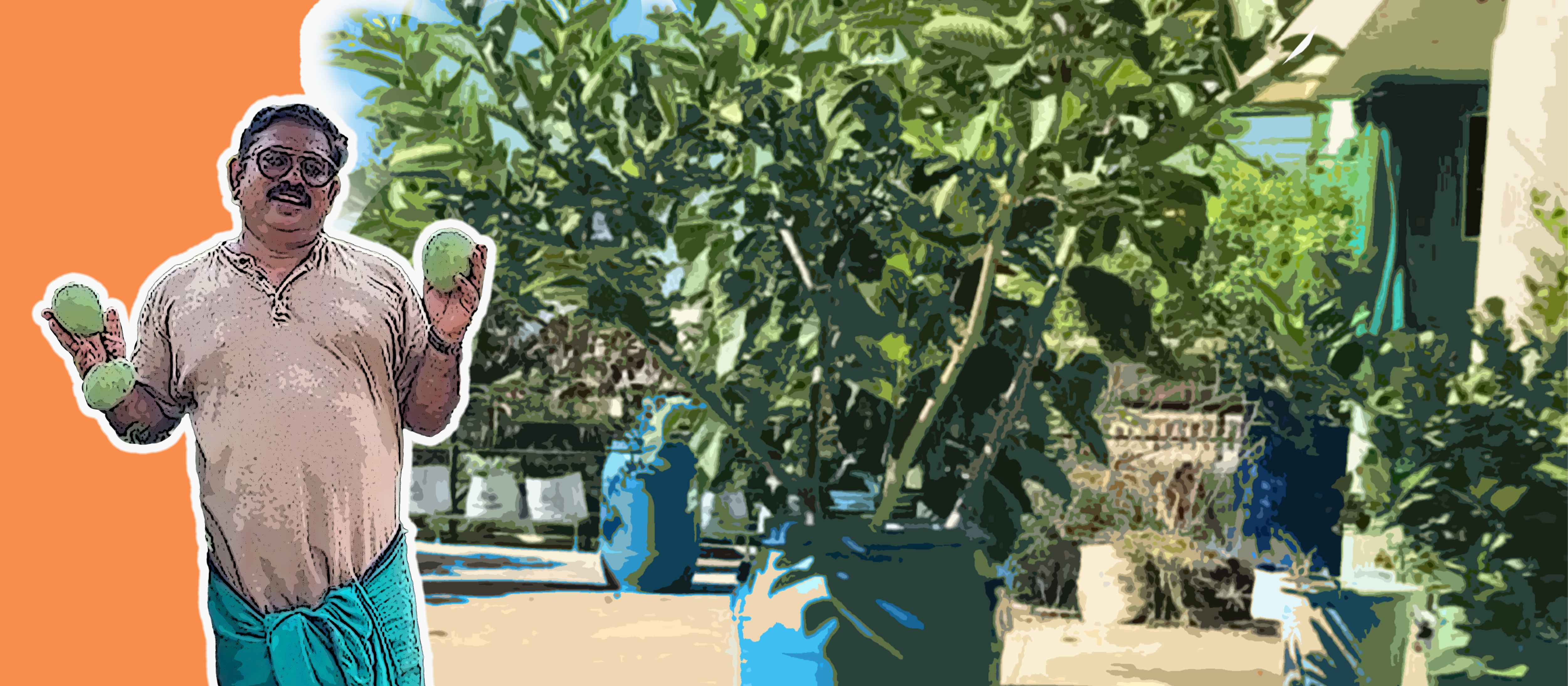
Are you a Jaini or do you have a Jaini friend? This is certainly a “foodgasmic” news for you. Ain’t it? So, how do we grow potatoes in air?
Not just potatoes, we’ve got a lot more. I’ve got a cool story to share with you today. It’s about a guy named Abdurazak from Kerala, who decided to grow fruit trees on his terrace using plastic drums instead of grow bags. Let’s dive in and learn more about his story- Grow Potatoes in air
Alternative to Grow Bags

Abdurazak, who spent 30 years in Dubai, returned to his hometown in Kerala and wanted to plant fruit trees at home. However, he realized that his terrace might not be enough. Most home gardeners grow fruit trees in grow bags, but he believed that this method stunted their growth and often rendered them fruitless. Hence, he decided to try an alternative method. He wanted to grow the trees in plastic drums. Today, he has a fruit orchard of 250 trees, of which 135 grow in drums.
Inspiration from Thailand
Abdurazak learned about the plastic drum method from a fruit farm in Thailand. During his time in the fruit wholesale business, he had the opportunity to interact with several farms and agencies from over 56 countries. One of the fruit farms in Thailand used this technique of growing fruits on plastic drums, where they grew fruits in thousands of such drums and reaped high yields. This method was adapted to reduce labour and the wastage of fertilizers. Around 75% of fertilizer is wasted when planting trees on land as it goes underground along with water only 25% absorb. Hence, this method actually stimulates the growth of trees.
Growing Fruit Trees on Plastic Drums

Abdurazak tested the plastic drum method by planting a few trees in plastic buckets first. It worked, so he bought used plastic drums from scrap shops and started growing trees in them. Each drum costs around Rs 700, which is half the price of unused or new drums. He suggests using this method only for personal purposes and not commercial purposes. This way, one can yield enough for their family. He recommends finding varieties of fruit trees that yield fruits in all seasons. His orchard currently houses around 250 fruit trees from different parts of India and countries such as Thailand, Pakistan, Brazil, and Australia. He mostly buys foreign varieties online and sources different varieties of mangoes from a Kolkata-based agency. He has around 70 foreign varieties of mangoes, different varieties of guava, and jackfruit trees.
Fruit Yield and Maintenance
Abdurazak says that fruit trees grown in drums yield much faster than those growing on the land. If the trees that grow on land take five years, the ones planted in drums would take only two years. However, even with faster yields, the number of fruits produced will be less in drums. If one gets 100 mangoes from a tree growing on land, they will only get 25 or 50 from the ones planted in drums. But one could utilize the space consumed by a big mango tree to grow around 10 to 15 trees in drums, of different varieties. Trees growing on land don’t require frequent watering, but those in plastic drums need it at least twice a day.
Abdurazak has set up a drip irrigation system on the terrace and waters them once in the morning and once in the evening. As the trees are on the terrace and exposed to the sun, they need more water than those on land. He uses a bio-slurry made out of cow dung, neem cake, bone meal, jaggery, and Sheema Konna leaves (Gliricidia sepium) mixed with water and sprays it on these trees. It also emphasizes the importance of pruning the trees from time to time to maintain their size to an optimum level. He suggests keeping them maximum up to 7 to 8 feet.
Conclusion
Abdurazak’s method of growing fruit trees in plastic drums is a great solution for anyone who wants to grow their own fruit but is narrow on space or sunlight. And hey, even if the yield per tree is less, the ability to plant multiple varieties in the same space is a win-win situation. Abdurazak’s experience in the fruit wholesale business has given him a unique perspective on fruit varieties, and his use of eco-friendly bio-slurry as fertilizer is a great example of innovation in gardening. So go ahead and give it a try, and if all else fails, remember: “Ye Bhi Theek Hai” (that works too)!
Overall, Abdurazak’s fruit orchard is a testament to the fact that with passion and innovation, even the smallest of spaces can be transformed into a fruitful oasis. His story is an inspiration to all those who aspire to grow their own food and make a positive impact on the environment.









